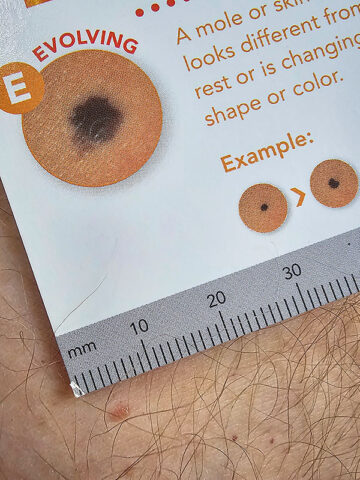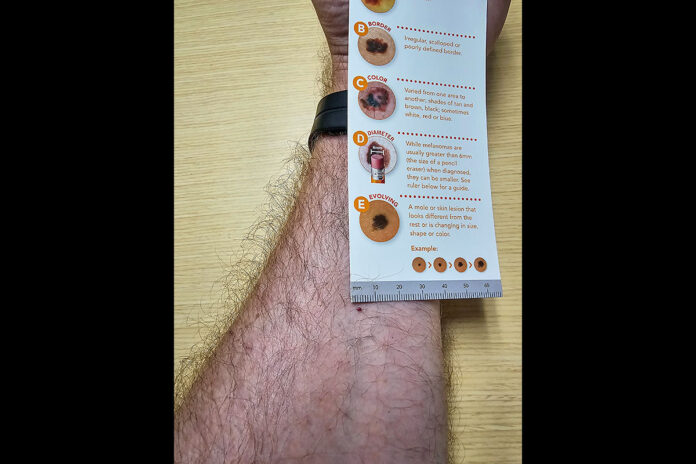 Fort Campbell, KY – According to the Center for Disease Control, skin cancer is the most common form of cancer in the United States. It is vital that everyone familiarize themselves with basic facts, can identify early warning signs, and take the necessary steps to treat or prevent skin problems.
Fort Campbell, KY – According to the Center for Disease Control, skin cancer is the most common form of cancer in the United States. It is vital that everyone familiarize themselves with basic facts, can identify early warning signs, and take the necessary steps to treat or prevent skin problems.
Even though May is National Skin Cancer Awareness Month, Blanchfield Army Community Hospital (BACH) reminds the patient population that skin cancer is something to check for year-round, as it can affect Soldiers’ mission readiness.
There are three basic types of skin cancer: basal cell carcinoma (BCC); squamous cell carcinoma (SCC); and melanoma. All are treatable with early detection. No two people are affected in the same way.

“A variety of factors come into play depending on the patient,” says Tom Tharp, a licensed practical nurse who works with BACH Dermatology.
“The most common factors are the amount of ultraviolet ray exposure from the sun or tanning beds; fair skin with many freckles; a history of sunburns with blistering; a family history of skin cancer from an immediate family member (mother, father, brother, sister); or if you have 50 or more moles on your body.”
BCC and SCC are the most common forms of skin cancer, but melanoma has the potential to be the deadliest. A regular self-check for problem areas will help ensure early detection, added Tharp.
The CDC outlines checking your skin for moles regularly will help you find any suspicious changes. Be sure to check less visible areas of your skin like the soles of your feet. Tell your doctor about any unusual moles or changes in your skin. Also talk to your doctor if you are at increased risk of skin cancer.
The CDC recommends an A-B-C-D-E approach to self-checks for melanoma:
A. Asymmetrical: Does the mole or spot have an irregular shape with two parts that look very different?
B. Border: Is the border irregular or jagged?
C. Color: Is the color uneven?
D. Diameter: Is the mole or spot larger than the size of a pea?
E. Evolving: Has the mole or spot changed during the past few weeks or months?
Talk to your doctor if you notice changes in your skin such as a new growth, a sore that doesn’t heal, a change in an old growth, or any of the A-B-C-D-Es of melanoma. “Regular skin checks are still necessary for those with darker skin color, with extra focus on the webbing between fingers and toes, under the nail beds, the palms of the hands, and soles of the feet,” said Tharp.
The CDC recommends simple protections and precautionary measures to limit exposure to ultraviolet rays. Protection from UV rays is important all year, not just during the summer. UV rays can reach you on cloudy and cool days, and they reflect off surfaces like water, cement, sand, and snow. In the continental United States, UV rays are strongest from 10 a.m. to 4 p.m. daylight saving time. The UV Index forecasts the strength of UV rays each day. If the UV index is 3 or higher in your area, protect your skin from too much exposure to the sun.
Several ways to protect your skin when the UV index is 3 or higher:
- Stay in the shade.
- Wear clothing that covers your arms and legs.
- Wear a hat with a wide brim to shade your face, head, ears, and neck.
- Wear sunglasses that wrap around and block both UVA and UVB rays.
- Use a broad-spectrum sunscreen with a sun protection factor (SPF) of 15 or higher.
“Be sure to keep up with basic hygiene using soap and water. Avoid vigorous scrubbing so you don’t remove healthy skin cells early,” Tharp says.
If you suspect something, ask your primary care manager for a referral to a dermatologist. BACH’s medical team is ready to assist with all your medical needs and provide you with a gold standard of care.
For more information, visit www.cdc.gov/skin-cancer/index.html



